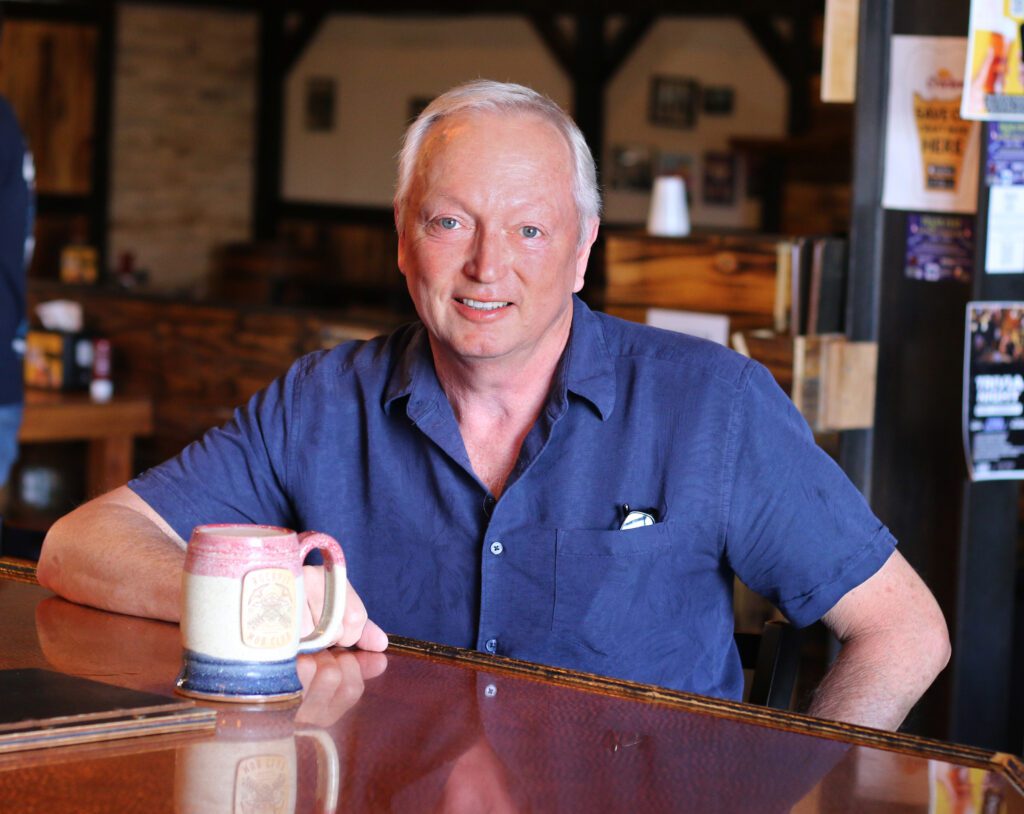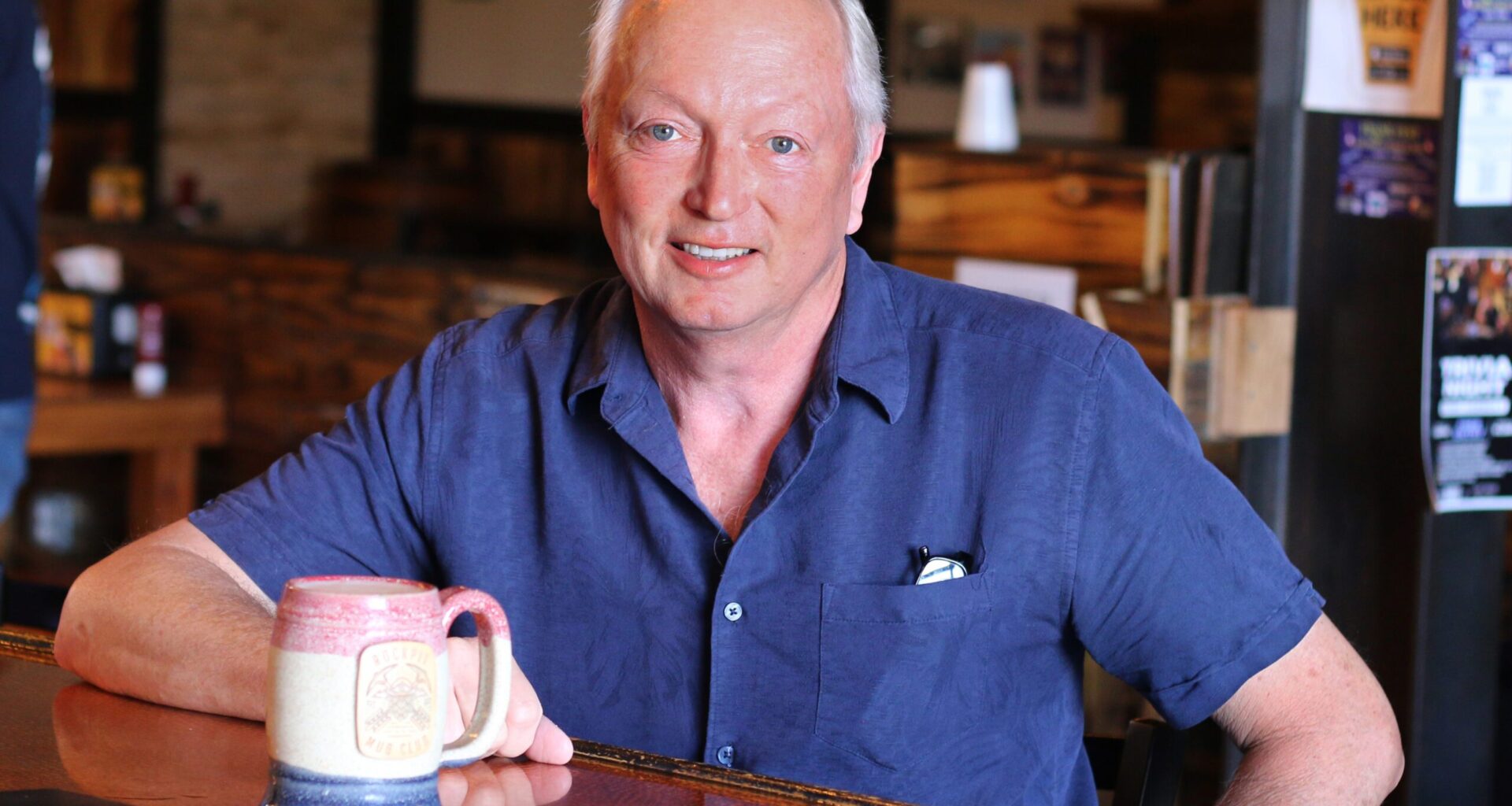In the SoDo District, RockPit Brewing & Distilling provides a warm ambience through its drinks and aesthetics. The exposed infrastructure and wooden fixtures create a rustic feel, reminiscent of a tavern for miners to find camaraderie after a long day. In the back, enormous metal distilling tanks glimmer under the yellowing lights. On occasion, the smell of freshly brewed beer or distilled moonshine greets you as you enter.
The family-owned brewery describes itself as a place “where a room full of strangers feels like home.” This is especially true for Brad Vanlandingham. You’ll often see him seated at the bar, conversing with fellow patrons and staff, including family members of co-founders Chris Rock and Sean Burke. Known as “the regular of the regulars,” Vanlandingham has frequented the brewery since the latter half of 2019.

(BARBARA IVINS)
Born and raised in Terre Haute, Indiana, Vanlandingham moved to Dallas, Texas, after graduating from Rose-Hulman Institute of Technology with an engineering degree. Then, he moved to Orlando, where he’s remained for the last 40 years as a consulting engineer for Black & Veatch. In July, Vanlandingham held his retirement party at RockPit.
His usual? An assortment of IPAs. Right now, he’s a fan of “Stupider” — a name we laughed over during a conversation in mid-October — made by Four Idiots Brewing Company and sold exclusively at RockPit. During our chat, Vanlandingham shared his nearly four decades of experience as an engineer and the start of his retirement, where he’s had more time for his two greatest passions: fishing and golf.
Why RockPit Brewing & Distilling?
It’s very family friendly. It’s dog friendly. They have music bingo on Wednesday night and trivia on Thursday night. Live bands, usually Fridays and Saturdays. They’ll have food trucks set up out here. It’s just a nice atmosphere. There’s lots of natural light coming through that garage door right there. A lot of times, when it’s not too hot or too cold, it’ll be open. And, I don’t know, there’s just something about it. I love to come here on Sunday afternoons and watch the final round of a golf tournament, come here on Saturdays and watch college football.
I don’t think there’s any place around here that has the atmosphere plus the quality and the variety of beer. They started distilling their own stuff, so now, if you don’t want a beer, if it’s too filling, you can have some of their house-made cocktails.
Everybody here is personal friends of mine. … A couple of them I’ve gone fishing with, couple of them I’ve played golf with. There’s a regular group that I do play golf with that I met through here. I’ve taken guided fishing trips on the other side of the state with some of the people in here. We go out to dinner every now and then together as a group. It’s just a good network of friends. If I was away, if I was out of town and needed somebody to go by my house and check on it, I just call one of my buddies that I met from in here.
Tell me about your time as a consulting engineer.
I started out doing just pure structural work. Then I gravitated towards being the engineer in charge of all the different disciplines and interfacing with our clients, and we did utility infrastructure. At first, I was designing high voltage power lines, and then I started designing water and wastewater infrastructure — so treatment plants, the tanks and the buildings, the basins. … It’s rewarding. Every project is unique, so it’s not repetitive at all. As a consultant, you have a budget, you have a schedule, and it can be rather demanding and stressful.
What is an aspect of your job that people don’t realize the importance of?
I don’t think a lot of people realize what goes into when you turn a faucet and water comes out — they just kind of take that for granted. They don’t realize where it goes when it goes down the drain, either, or when you flush the toilet. It’s out of sight, out of mind. There’s a lot of infrastructure out there that makes all that happen. Human beings can’t live without water for more than three days. If the power went off, everybody would be pretty inconvenienced. But if there were no water, what would you do? I mean, it’s essential for life. There’s a reason they call them sanitary sewers, even though that’s where your waste goes, because without that, sanitation is an issue. There’s a lot of diseases that come from that. So having proper disposal of our waste stream is important to public health and wellbeing.
Beyond work, and now that you’re retired, how do you spend your time?
I’m rather fanatical about two things: playing golf and fishing. I got bit by the fishing bug at a relatively young age. No one in my family really fished, but a friend of mine — I think we were in the seventh or eighth grade when we met — introduced me to fishing, and next thing I know, I’m just hooked on it.
So then I discovered inshore saltwater, rather than just freshwater, when I moved down here. I bought a flats boat that runs in shallow water, and you can catch redfish and spotted sea trout — and the various species that live in salt water — not out in the deep blue ocean, but in Indian River and Mosquito Lagoon. I still have the boat. It’s home in my garage and displaced two cars for many years now.
What was a memorable fishing trip for you?
I was in Mosquito Lagoon … and I was in about maybe 18 inches of water — might’ve been a little deeper, but two feet at the most. I was drifting along with the wind kind of silently, and you can just imagine fish are very spooky in water that deep. From the other direction, a school of redfish was traveling down this bank, but I was drifting the opposite direction, and we just encountered each other. Suddenly, as far as I could see around me — literally, as far as I could see — there were nothing but redfishes.
So, I very carefully picked one out. The fish was pretty much looking straight at me … I made a soft underhand cast with a soft plastic bait, and cast beyond it so it didn’t see the lure land. Then, as I pulled it up really slowly up near its head, once it got within its field of vision, I twitched the bait. I saw that fish see it, turn, go over and open his mouth, take it. I set the hook, and that fish went “waboom.” … And when it did that, the water went “whoosh” — every one of those fish did the same thing. It was like the water just erupted.
I’m holding on. I’ve got a 10-pound test, and I’ve got a 35-, 40-pound fish hooked up — it just took off. And I’m like “zrrreeeeee” — the drag is just going out. So I had to get on the trolling motor and go towards it to recover line. Then, like 40 minutes later, it got tired enough that I could get my hands on it and get it in the boat. Talk about exciting adrenaline. I mean, you don’t see that kind of stuff every day. But there was hundreds in that school.
Tell me about your love of golfing.
My fishing buddy, oddly enough, introduced me to the game of golf when I was 36 years old. I’m 64 now. So, what is that, 28 years ago? I started playing. I must be this obsessive kind of person — once I decide I’m going to do something, I’m “Mr. All-In,” right? For a while, I pretty much quit fishing, and it was just all about golf. I kind of had a little bit of a knack for it. I was making pars almost immediately and just wanted to get better and better and better. It’s an ongoing pursuit. I love being outdoors, and love being physically active. So, now that I’m retired, that’s exactly what I want to do.
But you still fish, right?
Yeah. I’ll be obsessed with one for a while, then obsess and go back to the other. A little surf and turf.

